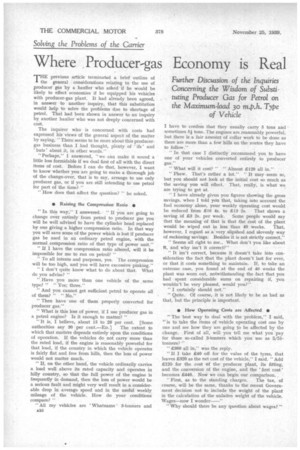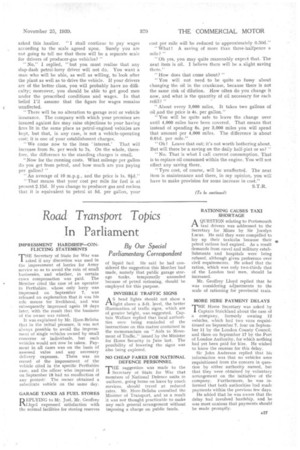Where Producer-gas Economy is Real
Page 36

Page 37

If you've noticed an error in this article please click here to report it so we can fix it.
Further Discussion of the Inquiries Concerning the Wisdom of Substituting Producer Gas for Petrol on the Maximum-load 3o m.p.h. Type
E previous article terminated a brief outline of the general considerations relating to the use of producer gas by a haulier who asked • if he would be likely to effect economies if he equipped his vehicles with producer-gas plant. It had already been agreed, in answer to another inquiry, that this substitution would help to solve the problems due to shortage of petrol. That had been shown in answer to an inquiry by another haulier who was not deeply concerned with cost.
The inquirer who is concerned with costs had expressed his views of the general aspect of the matter by saying, " There seems to be more about this producergas business than I had thought, plenty of ifs' and ' buts' about it, in other words."
"Perhaps," I answered, "we can make it sound a little less formidable if we deal first of all with the direct items of cost. Before I can do that, however, I want to know whether you are going to make a thorough job of the change-over, that is to say, arrange to use only producer gas, or if you are .still intending to use petrol for part of the time? "
" How does that affect the question? " he asked.
• Raising the Compression Ratio • " In this way," I answered. "If you are going to change over entirely from petrol to producer gas you will be well advised to have the cylinder head replaced by one giving a higher compression ratio. In that way you will save some of the power which is lost if producer gas be used in an ordinary petrol engine, with the normal compression ratio of that type of power unit" "If I have the compression ratio altered, will it be impossible for me to run on petrol? ". "To all intents and purposes, yes. The compression will be too high, and you will have excessive pinking."
"I don't quite know what to do about that. What do you advise? "
"Have you more than one vehicle of the same type? " " Yes; three."
"And you cannot get sufficient petrol to operate all of them? " "No."
"Then have one of them properly converted for producer gas."
"What is this loss of power, if I use producer gas in a petrol engine? Is it enough to matter? "
"It is, I believe, about 15 to 20 per cent. [Some authorities say 30 per cent.—ED.] The extent to which that matters depends entirely upon the conditions of operation. If the vehicles do not carry more than the rated load, if the engine is reasonably powerful for that load, if the country in which the vehicle operates is fairly fiat and free from hills, then the loss of power would not matter much.
"If, on the other hand, the vehicle ordinarily carries a load well above its rated capacity and operates in hilly country, so that the full power of the engine is frequently in demand, then the loss of power would be a serious fault and might very well result in a considerable drop in average speed and in the useful weekly mileage of the vehicle. How do your conditions compare? "
"All my vehicles are Whatname ' 3-tonners and a`26 I have to confess that they usually carry 5 tons and sometimes 5i tons. The engines are reasonably powerful, but there is a fair amount of collar work to be done as there are more than a few hills on the routes they have to follow."
"In that case I distinctly recommend you to have one of your vehicles converted entirely to producer gas."
" What will it cost? " " Almost £120 all in."
"Phew. That's rather a lot." "It may seem so, but you should not look at the initial cost so much as the saving you will effect. That, really, is what we are trying to get at.
"I have already given you figures showing the gross savings, when I told you that, taking into account the fuel economy alone, your weekly operating cost would be reduced from £16 4s. to £13 2s. That shows a saving of £3 2s. per week. Some people would say that the meaning of that is that the cost of the plant would be wiped out in less than 40 weeks. That, however, I regard as a very slipshod and slovenly way of reckoning savings. Besides it is not strictly correct."
"Seems all right to me.. What don't you like about ft, and why isn't it correct?"
"It isn't correct, because it doesn't take into consideration the fact that the plant doesn't last for ever, or that it costs something to maintain. If, to take an extreme case, you found at the end of 40 weeks the plant was worn out, notwithstanding the fact that you had spent considerable sums on repairing it, you wouldn't be very pleased, would you?"
"I certainly should not."
" Quite. Of course, it is not likely to be as bad as that, but the principle is important.
• How Operating Costs are Affected • " The best way to deal with the problem," I said, " is to take the items of vehicle operating cost one by one and see how they are going to be affected by the change. First of all, will you tell me what you pay for these so-called 3-tonners which you use as tonners? "
"£360 all in," was the reply.
"If I take £40 off for the value of the tyres, that leaves £320 as the net cost of the vehicle," I said. "Add £120 for the cost of the producer plant, its fitting, and the conversion of the engine, and the 'first cost' becomes £440. Now we can begin our comparison.
"First, as to the standing charges. The tax, of course, will be the same, thanks to the recent Government decision not to include the weight of the plant in the calculation of the unladen weight of the vehicle.
Wages—now I wonder " "Why should there be any question about wages?" asked this •haulier. " I shall continue to pay wages according to the scale agreed upon. Surely you are not going to tell me that there will be a separate scale for drivers of producer-gas vehicles? "
"No,' I replied, " but you must realize that any slap-dash petrol-lorry driver will not do. You want a man who will be able, as well as willing, to look after the plant as well as to drive the vehicle. If your drivers are of the better class, you will probably have no difficulty; moreover, you should be able to get good men under the prescribed conditions and wages. In that belief I'll assume that the figure for wages remains unaffected.
" There will be no alteration to garage rent or vehicle insurance. The company with which your premises are insured against fire may raise objections to your having fires lit in the same place as petrol4ngined vehicles are kept, but that, in any case, is not a vehicle-operating cost; it is one of your establishment charges.
" We come now to the item 'interest.' That will increase from 5s. per week to 7s. On the whole, therefore, the difference to the standing charges is small,
"Now for the running costs. What mileage per gallon do you get from petrol, and how much are you paying per gallon? "
"An average of 10 m.p.g., and the price is Is.
"That means that your' cost per mile for fuel is at present 2.15d. If you change to producer gas and reckon that it is equivalent to petrol at 5d. per gallon, your
cost per mile will be reduced to approximately 0.50d." " What I A saving of more than three-halfpence a mile?"
"Oh yes, you may quite reasonably expect that. The next item is oil. I believe there will be a slight saving there."
" How does that come about? "
"You will not need to be quite so fussy about changing the oil in the crankcase, because there is not the same risk of dilution. How often do you change it now, and what is the quantity of oil necessary for each refill? "
"About every 3,000 miles. It takes two gallons of oil and the price is 4s. per gallon."
"You will be quite safe to leave the change over until 4,000 miles have been covered. That means that instead of spending 8s. per 3,000 miles you will spend that amount per 4,000 miles. The difference is about 0.01d. per mile."
" Oh I Leave that out; it's not worth bothering about.• But will there be a saving on the daily half-pint or so?
"No. That is what I call current consumption. That is to replace oil consumed within the engine. You will not effect any saving there.
"Tyre cost, of course, will be unaffected. The next item is maintenance and there, in my opinion, you will have to make provision for some increase in cost."






























































